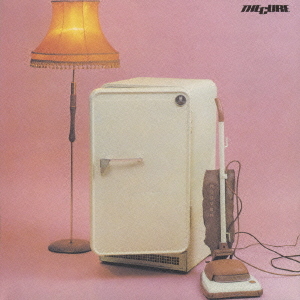Top Qs
Timeline
Chat
Perspective
Three Imaginary Boys
1979 studio album by the Cure From Wikipedia, the free encyclopedia
Remove ads
Three Imaginary Boys is the debut studio album by the English rock band the Cure, released on 8 May 1979 by Fiction Records,[3] and reached number 44 on the UK Albums Chart.[4] It was later released in the United States, Canada, and Australia with a different track listing as a compilation album titled Boys Don't Cry.[5]
Remove ads
Production and content
The record company decided which songs were put on the album and running order,[6] as well as the cover artwork, without Robert Smith's consent. For all Cure albums since, Smith has ensured that he is given complete creative control over the final product before it goes on sale.[7] The "Foxy Lady" soundcheck, with vocals sung by Michael Dempsey, was not supposed to be on the album, and was removed for the American release. Smith has stated that "songs like 'Object' and 'World War' and our cover of 'Foxy Lady' were [producer] Chris Parry's choice".[8]
In a Spin interview from 1987, Smith said he was never happy with the album. He said he "was very angst-ridden, very dislocated", at the time of its creation, and said he did not think there was "any sense of emotion on that first album at all. A lot of it was very superficial—I didn't even like it at the time. There were criticisms made that it was very lightweight, and I thought they were justified. Even when we'd make it, I wanted to do something I though had more substance to it."[9] He also said the album's production was rushed, with him writing lyrics to songs while he was singing them.[10]
Remove ads
Release
Three Imaginary Boys was originally released on 8 May 1979 by record label Fiction.
The album was reissued on 29 November 2004 and featured a second disc of unreleased material, including songs recorded under the band name Easy Cure with Porl Thompson. It was originally supposed to be released in early 2004 along with the band's next three studio albums (Seventeen Seconds, Faith and Pornography), but was delayed multiple times before being released by itself at the end of 2004. As it featured a variety of old songs, it was the only deluxe edition by the band that did not include an alternate version of each song on the first disc. Some of the early booklets in the reissue had missing lyrics, which were made available on the Cure's website in PDF form.[citation needed] All copies since contain the lyrics.
A one-disc reissue was released on 5 September 2005, containing only the original album. It was also released in the standard jewel case rather than in a box. In some countries, the deluxe edition has become a collector's item as production was phased out, being replaced by the more economic single-disc version.
Remove ads
Reception
Summarize
Perspective
Despite Smith's displeasure with the record, Three Imaginary Boys was well received critically at the time of its release.[7] Sounds' Dave McCullough praised it in a 5-star review and noted: "The Cure are going somewhere different on each track, the ideas are startling and disarming." McCullough noted the variety of the material and qualified "Grinding Halt" as a "pop song that reminds you of the Isley Brothers or the Buzzcocks."[19] Red Starr, writing in Smash Hits, described the album as a "brilliant, compelling debut."[18] However, NME's Paul Morley did not share the same point of view and wrote: "Most of the time, it's a voice catching its breath, a cautiously primitive riff guitar, toy drumming and a sprightly bass."[21]
Chris True of AllMusic retrospectively called the album "a very strong debut" and a "semi-detached bit of late-'70s English pop-punk".[11] Nitsuh Abebe of Pitchfork likened the album to a "new wave Wire... [or] Joy Division" and called it "as original a record as anything else to spin off from the tail end of punk."[15] He also called the album "spiky post-punk."[22] BBC Music critic Simon Morgan said "Smith was forging his own take on the post-punk zeitgeist,"[23] while author Martin C. Strong said it "remains among the Cure's finest work," adding that "their strangely accessible post-punk snippets lent an air of suppressed melancholy."[24] The album was also described as "a collection of melodic but slightly kooky power-pop" by Chris Gerard of PopMatters.[25]
50th anniversary plans
On 14 October 2024, Robert Smith announced plans for retiring in 2029 following the 50th anniversary of Three Imaginary Boys. "I'm 70 in 2029, and that's the 50th anniversary of the first Cure album [Three Imaginary Boys]. If I make it that far, that's it. In the intervening time, I'd like to include playing concerts as part of the overall plan of what we’re going to do. I've loved it; the last 10 years of playing shows have been the best 10 years of being in the band. It pisses all over the other 30-odd years! It’s been great."[26]
Remove ads
Track listing
Summarize
Perspective
All tracks are written by the Cure (Robert Smith, Michael Dempsey and Lol Tolhurst), except "Foxy Lady" written by Jimi Hendrix.
Remove ads
Personnel
The Cure
- Robert Smith – guitar, lead vocals (all but "Foxy Lady"), harmonica ("Subway Song")
- Michael Dempsey – bass, backing and lead ("Foxy Lady") vocals
- Lol Tolhurst – drums
Additional personnel
- Porl Thompson – lead guitar, backing vocals (1–4, 6, 7 of bonus disc)
Technical
- David Dragon – sleeve illustrations
- Michael J. Dutton – "assistant"
- Martyn Goddard – sleeve photography
- Mike Hedges – engineering
- Connie Jude – sleeve illustrations
- Chris Parry – production
- Bill Smith – art direction, sleeve design, additional photography
Remove ads
Certifications and sales
References
External links
Wikiwand - on
Seamless Wikipedia browsing. On steroids.
Remove ads

